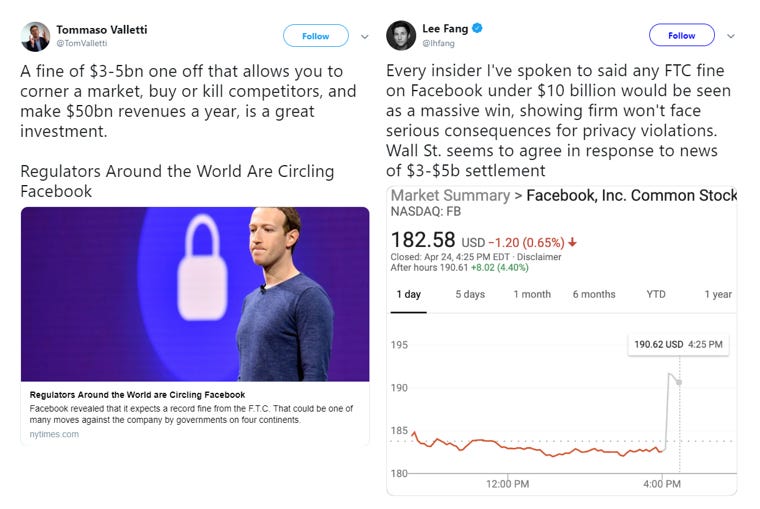
There is no better insight into the current difficulty of regulating social media than the fact Facebook can make provision for a fine up to $5 billion.
Facebook has $45 billion in cash and securities on hand and generates $5 billion in cash each quarter, even after investments in property and equipment, so it can more than afford the fine.
As we’ve said in earlier newsletters, the negative consequences of social media (and Facebook in particular) are inherent to both their management and business model.
Thanks to the dual share structure of Facebook, the majority of shareholders are helpless too.
Four shareholder proposals on the proxy ballot call for slicing away at Zuckerberg’s authority over Facebook.
“Facebook operates essentially as a dictatorship,” observes the supporting statement for one of those proposals. “Shareholders cannot call special meetings and have no right to act by written consent. A supermajority vote is required to amend certain bylaws. Our Board is locked into an out-dated governance structure that reduces board accountability to shareholders.”
New Zealand Prime Minister Jacinda Ardern has it right — individually no amount of hollow threats and hand wringing by nations will address this.
“What we’re trying to tackle here is a global issue and I think it requires a global response. New Zealand is looking to play a leadership role because what happened here on the 15th of March was unprecedented in the way that is used the internet, so with that does come a responsibility to try and make change.”
Back to the future
No talk of radical policies, no mention of Medicare4All and nothing about billionaires and income inequality.
Joe Biden will run a reactionary campaign based on a vision that seems out of place in 2019.
Despite all that, this is an excellent launch video that plays to his strengths.
Biden has rejected the conventional wisdom ascendant in Democratic politics by framing the campaign as a referendum on Trump’s character and his behavior in office. Biden and his advisers have bet his candidacy on the idea that a focus on the incumbent, more than new policy ideas, anti-establishment crusades or ideological innovation, will win back the White House for Democrats.
We have to applaud this mindset — too often in campaigns, to justify their existence, those running the comms see their job as reinventing the candidate.
To have the confidence to know the candidate, embrace their strengths no matter how unfashionable and shape the campaign around those is admirable.
Note that in every poll about the Democratic primary, the two leading candidates are seventy plus year old men and the eventual winner will be competing against another septuagenarian.
What do Biden, Sanders and Trump have in common?
A clarity of message and a commitment to their specific ideologies that is unswayed by outside forces and fashions.
Quick Notes
How good is the Facebook business model? They make money from China, which has banned it at home but uses it to generate influence globally.

The winner of Ukraine’s presidential election was not a disruptive CEO or a charismatic young technocrat but a TV comedian who played the President on TV.
Mr. Zelensky’s victory will give Ukraine its first Jewish leader and deliver a stinging rebuke to a political and business establishment represented by Mr. Poroshenko, a billionaire candy tycoon who campaigned on the nationalist slogan “Army, language, faith.”
After five years of grinding war with Russian proxies in the east of Ukraine, voters appeared to send a signal that they were more concerned with the internal menaces of corruption and poverty



